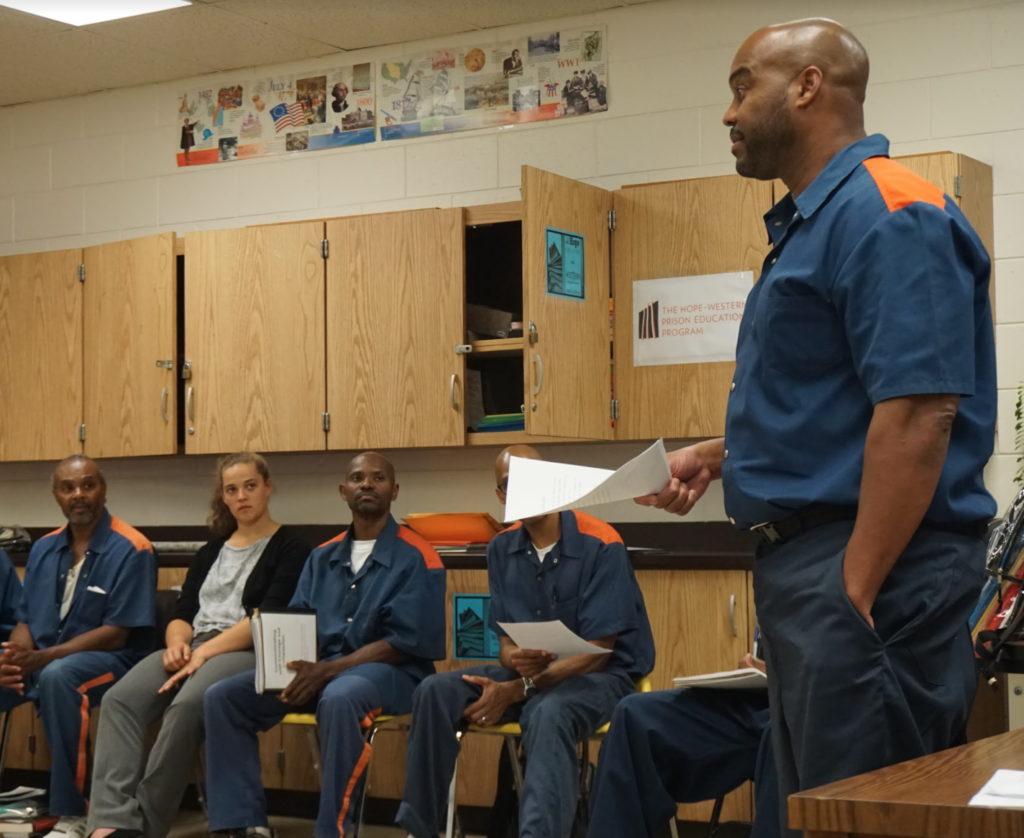(And what to bring when you do)
On Good Friday we read in Isaiah:
He was spurned and avoided by people,
Is 53:3,8
a man of suffering, accustomed to infirmity,
one of those from whom people hide their faces,
spurned, and we held him in no esteem… Oppressed and condemned, he was taken away, and who would have thought any more of his destiny when he was cut off from the land of the living…
Did I think of the Suffering Servant as this reading was proclaimed? Sure, but my mind drifted to a group of men 45 minutes up the road. Men incarcerated at Muskegon Correctional Facility. Men who hope to one day earn a Hope College degree. Men who are spurned, avoided, cut off. Condemned.
Jesus tells his followers this:
Then the King will say to those on his right, ‘Come, you who are blessed by my Father; take your inheritance, the kingdom prepared for you since the creation of the world. For I was hungry and you gave me something to eat, I was thirsty and you gave me something to drink, I was a stranger and you invited me in, I needed clothes and you clothed me, I was sick and you looked after me, I was in prison and you came to visit me.’
Mt. 25:31-36

But why? Why does Jesus, the Suffering Servant, include visiting the prisoner among the corporal works of mercy? The other categories seem rather obvious because of their universality. Giving food to the hungry helps with their hunger, and most of us have experienced hunger, even briefly. Giving water to the thirsty helps with their thirst, and we’ve all been thirsty, even briefly. A gift of clothing keeps the naked warm and preserves their modesty, and we all know what it feels like to be cold and ashamed. But prisoners? Probably not. They’re beyond our experience.
Michael Van Sloun has this to say:
Jesus has mercy for “the least,” those despised by others. Convicts rank high among “the least.” For the general public, when a criminal gets prison time, the criminal is getting what is deserved; the criminal needs to pay for what has been done. Jesus understands the brokenness of those who have done hateful things. From the cross Jesus said, “Father, forgive them, they know not what they do” (Lk 23:34). Jesus wants us to have compassion for those in jail or prison. Instead of having an attitude of anger, retribution, punishment or vengefulness, Jesus wants us to be merciful. We need to honestly acknowledge our own inclination to evildoing and admit, “There, except by the grace of God, go I.” Prison time is hard time. It is lonely time. It is dangerous time. Prisoners need help, support, encouragement and prayers. And as Jesus explained, a visit is a great way to help a prisoner.
R.J. Snell helps us center the idea of what it means to “do good” in our modern times, with its evolved understanding of justice:
Justice is not enough; mercy and forgiveness are also required. Evil is repaid with goodness, not in a way which denies justice but in “a manner unexpected by reason itself.” Aristotle has no category for redemption, no expectation that the vicious man could enjoy beatitude. Consequently, the Christian sees both more wretchedness and more exaltation in the human condition than did the Greeks, believing in both original sin and the incarnation. All men are grass, all sinful, and yet all are created in the image of God and all are offered a share in the divine glory through the startling fact of Easter. No one is beyond redemption, no one disposable.
The parable in Matthew 25 suggests that mercy requires “product and presence.” “Doing for” and “being with.” We bring food to the hungry. We bring drink to the thirsty. We bring medicine to the sick, and clothing to the naked. We help the homeless find shelter. But what do we bring the prisoner? More specifically, what do we at Hope College and Western Theological Seminary bring the prisoner? We bring what we have: The product of our years in graduate school, years of teaching experience, and understanding of discovered and revealed truth. We bring the product of our institutional missions:
By God’s grace, Western Theological Seminary forms women and men for faithful Christian ministry and participation in the Triune God’s ongoing redemptive work in the world.
The mission of Hope College is to educate students for lives of leadership and service in a global society through academic and co-curricular programs of recognized excellence in the liberal arts and in the context of the historic Christian faith.

This is what we have. This is what we bring: Our own presence which dignifies and respects those in prison. We bring education and formation that gives them an opportunity to grow in their faith, leadership abilities, and capacity for service.
This is how we acknowledge the prisoner’s kinship to the Suffering Servant.


